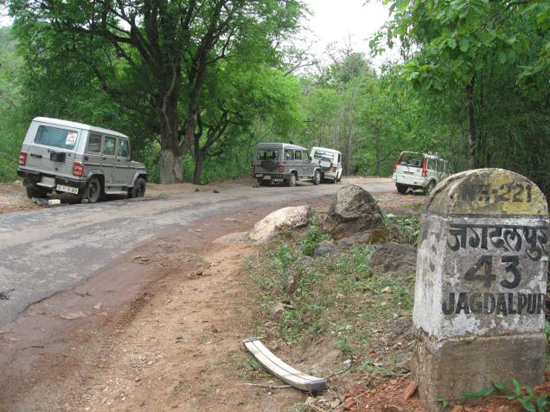Darbha (Bastar), May 27: Maoist military planners chose the ‘deliberate ambush’ method in the Darbha attack on Saturday to kill Congress leaders. They set up traps, planted improvised devices and placed sharpshooters at strategic locations after a recce of the terrain. Maoist documents and the testimonies of the ground-level security forces bear out this theory.
Maoists have one of the oldest divisions in the Darbha area, reporting to the Chhattisgarh state committee, DKSZC. Apparently, the hilly road connecting Jagdalpur to Sukma, where the ambush took place, was well mapped by the division members. As the convoy approached a sharp turn, the blast took place. The impact tossed a vehicle 20 feet above the ground and it fell into the steep, rocky low ground by the road.
“At least 100-150 kg of explosive was used for the blast,” said an officer. An undefined number of sharp shooters opened fire from higher ground and bullets slanted into the vehicles. All the vehicles of the motorcade, still resting by the road, had flat tyres. Rebels then forced the leaders out, made them walk upland and peppered them with bullets.
Maoists have three types of ambush — Deliberate, Opportunity and Mobile. Opportunity and Mobile are resorted to when they do not get enough time to plan an attack. But like in the 2010 Chintalnar massacre in Chhattisgarh when 76 soldiers were killed, on Saturday the cadres had enough time to plan. The Congress helped the Maoists to comfortably coordinate a ‘deliberate ambush’ by announcing their travel plans well ahead — a violation of standard operating procedures in a conflict area.
“The Congress was going deep inside Bastar to campaign, unlike in the last election. Their leadership should also have kept in mind that every Maoist release named the party’s top leaders as their enemies,” said a security official.
However, one may counter the official’s argument that Saturday’s ambush did not take place in any remote area, but on a busy road, 43 km from Jagdalpur city and 20 km from one of the tourist hotspots, Tirathgarh. “Even on Saturday, 15-20 tourist teams came to visit the waterfall and the caves at Tirathgarh,” said a forest guard.
Congress workers told The Hindu that they were told to mobilise more people for the rallies to grab the “empty political space.” “This time the party chief told us to go deep inside to build a mass base, to resist any attempt to manipulate the election,” said a Congress worker.
However, the man who tried to mobilise the party to ensure its victory in the November election, Nand Kumar Patel, himself has paid with his life.
Usually, fighting intensifies between the security forces and the Maoists in Bastar between February and June, just before the monsoon sets in. The forest cover disappears after spring, making each other’s target more visible. The Maoists organise their Tactical Counter Offensive Campaign (TCOC) around this time and plan the offensives.
“If we do not go on an offensive this time of the year, the rebels will corner us, like in 2010. We have to plan our offences around this time of the year, to protect ourselves,” said a senior Home Ministry official.
The security operations were particularly intense for the last one year. The forces were entering areas where they never thought of venturing before. For example, Pidiya in south Bastar is one Maoist stronghold where the forces hardly entered before, which they did at least twice in the last five months.
“In addition, the number of operations increased by six to eight times in the last couple of years,” said a senior official.
The operations were making life difficult for the rebels. Police claim that Maoist recruitments were declining, their mobility was getting restricted and surrenders were increasing. The operation on the Andhra Pradesh border virtually wiped out the entire leadership a few weeks ago.
The joint forces operations in Edesmeta that killed innocent civilians also irked the Maoists. “The more innocents die, the more they [Maoists] feel guilty. They feel, they should avenge these deaths. Collateral damage, like in Edesmeta, never help,” said a journalist.
In this context, it was inevitable that the guerrilla fighters would counter-attack sooner rather than later to loosen the stranglehold of the security forces. Congress workers wish they had this security advice before.

